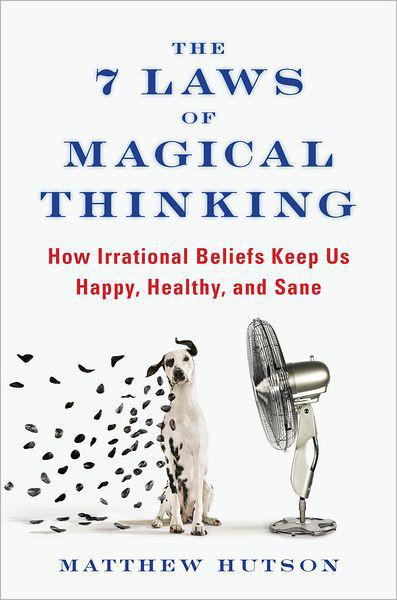
The 7 Laws of Magical Thinking
How Irrational Beliefs Keep Us Happy, Healthy, and Sane
کتاب های مرتبط
- اطلاعات
- نقد و بررسی
- دیدگاه کاربران
نقد و بررسی

October 3, 2011
In this sprightly pop-psychology treatise, Hutson roots our most pixilated notions in extensions and overgeneralizations of the same mental processes that cope with cold reality. The brain’s penchant for recognizing patterns, he contends, prompts us to discern God’s mysterious ways behind random misfortunes and correlate superstitious rituals with lucky happenstances. Our biologically programmed ideas about contagion invests inanimate objects with the auras of celebrities who touched them. Our socially adaptive attunement to human mental states makes us think nature is suffused with conscious intent, and imagine that our minds can telekinetically move the world. And our capacity for abstract thought lets even atheists have faith in a symbolic afterlife. Hutson’s lucid and entertaining treatment blends brain science, evolutionary theory, and cultural commentary on everything from spells and amulets to the rap duo Insane Clown Posse. He’s not exactly a believer, but he sees the psychological and social value in people believing themselves to be magically lucky, empowered, and connected to a caring and morally responsive universe. This illuminating exploration of the science of unscientific convictions by a former news editor at Psychology Today nicely balances bemused skepticism with warm appreciation for the mind’s fanciful, functional creativity.

April 1, 2012
A breezy, middling work of pop psych, working an obvious thesis to obvious ends. Poor dumb humans. We cling to sentimental objects such as wedding rings, think we can beat the odds at Vegas and believe in justice and the karmic rule that what goes around comes around. Well, writes former Psychology Today news editor Hutson, that's the way we're wired, so just "chillax." There's nothing new in the observation that human thought is shot through with irrationality, that we tend to invest objects with magical properties, or that we harbor unreasonable beliefs. But what does it tell us about ourselves that companies can make a pretty penny selling packets of soil from Jerusalem? That we're a superstitious people, as superstitious as our forebears, who bought and sold holy relics for ages. And that we believe that actions have distant consequences? That's not quite so silly, given what we know of chaos theory, difficult science that evades analysis here. There is danger, of course, in thinking too symbolically, as Hutson notes; we have only to consider the figure of Don Quixote, who is himself a walking symbol. But how many of us live the life of Walter Mitty? There's some utility in the author's underlying program of skepticism, considering the flim-flam artists who work the fringes of the paranormal and New Age worlds, but it's not quite satisfactory to adduce the "law of truly large numbers" to explain the simple fact that there's a sucker born every minute. Given that no one can really escape from thinking magically, this book really should be called simply The 7 Laws of Thinking. No competition against meatier books on the mind from the likes of Sacks, Damasio, Hofstadter, Ariely and others.
COPYRIGHT(2012) Kirkus Reviews, ALL RIGHTS RESERVED.

February 15, 2012
Even if you're a hard-core skeptic who walks under ladders, Hutson writes in this very interesting book, you believe in magic. That's because magic, at least the way Hutson defines it here, isn't just about sorcerers and spells and sleight-of-hand (although those things do play a role). Magic, Hutson argues, is the way we tend to blur the line between subjectivity and objectivitythe way we become attached to objects with historical or emotional significance (collectibles, for instance), or the way we see symbols of things as the things themselves (a flag is not merely a flag but the country it represents). Packed with references to pop cultureSaturday Night Live, 30 Rock, sf writer Philip K. Dickthe book is, at its heart, a look at how we restructure the world around us to match our own perceptions of it. Hutson also touches on such topics as voodoo, superstition, and destiny, showing how each is fundamentally tied to our perceptions of them. Thought-provoking and highly readable.(Reprinted with permission of Booklist, copyright 2012, American Library Association.)

























دیدگاه کاربران